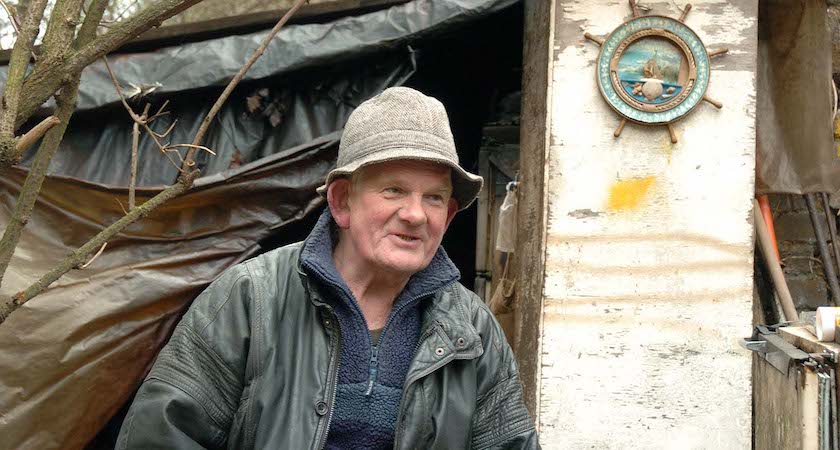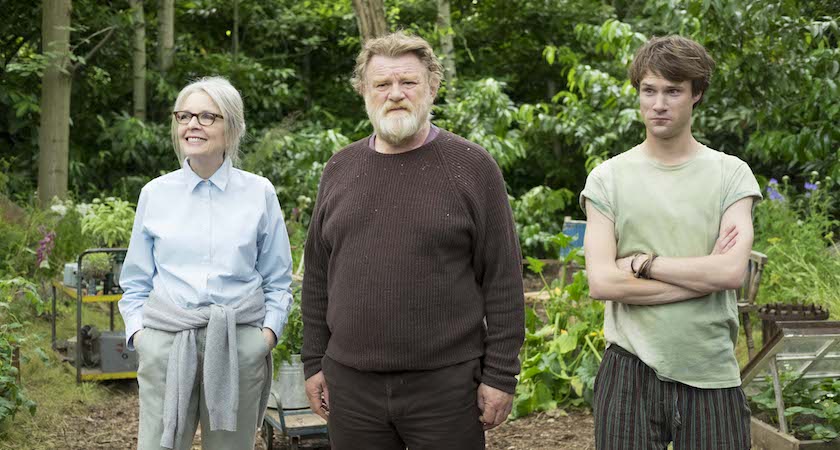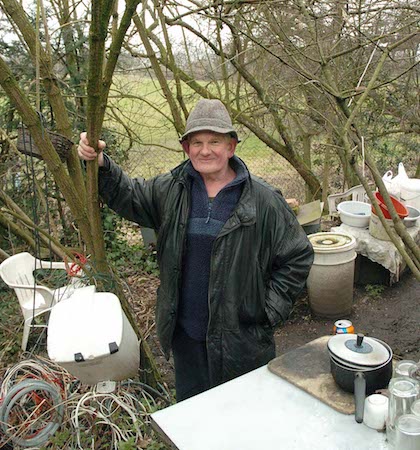NEW film Hampstead, starring Brendan Gleeson, takes inspiration from the life of the late Harry Hallowes – one of London’s most colourful characters.
Released on June 23 and starring internationally acclaimed Dublin-born actor Brendan Gleeson alongside Diane Keaton, new movie Hampstead is inspired by the true story of renowned squatter – Irishman Harry Hallowes, who passed away in February 2016, aged 88.
Sligo man Harry gained world renown for achieving squatter’s rights for his makeshift home on a patch of land near Athlone House on London’s Hampstead Heath, defeating property developers in the process.
Now film-makers have brought Harry’s tale to the big screen.
Scroll down to read our original interview with Harry Hallowes from 2005
Hampstead follows the progress of American widow Emily Walters (Diane Keaton).
Emily is living on the edge of the Heath but, despite encouragement from her close friend Fiona (Lesley Manville), she can’t quite seem to focus on the things that need attention, like her lovely old apartment, her finances and even her son.
One day while looking out across the Heath from her attic window, she spies a ramshackle hut, which appears to be inhabited by a rather unkempt man: Donald Horner (Gleeson).
She witnesses him being attacked by a group of professional thugs. Shocked, she calls the police and watches, through her binoculars, as help arrives. The next day she ventures into the woods in search of the man.
Donald has lived quietly and harmoniously on the edge of the Heath for 17 years but now his lifestyle is under threat – his home is the target of property developers who’ve started using heavy-handed tactics to remove him.
Naturally suspicious of Emily, Donald politely rebuffs Emily’s attention, but despite his gruff exterior, there is something gentle and alluring about him.
When Emily discovers that Fiona is leading a community initiative in support of the developers, she bravely steps up to take Donald's side in the escalating battle to save his peaceful Heath dwelling.
In what is a charming, funny, and life-affirming tale about how love can be found in the most unexpected places, Emily becomes ever more determined to defend the emotional and physical livelihood of this quiet and unusual man - a man who might just be the person to sweep her off her feet.
The Irish Post took a keen interest in the original story of Harry Hallowes when his story first became more widely known.
In celebration of the film’s release and in memory of a remarkable man, we reprint below the original story by our reporter Amanda Diamond, as it appeared in 2005.
Hampstead is released in Britain on June 23
 Harry Hallowes at his home on Hampstead Heath in North London on March 7, 2005 (Picture: Malcolm McNally)
Harry Hallowes at his home on Hampstead Heath in North London on March 7, 2005 (Picture: Malcolm McNally)Hampstead Harry not the man for millionaire’s row
IT might look nothing more than a patch of scrubland. But it’s been an Irishman’s home for almost 20 years — and it could net him £2million if he wanted.
But there are some thing’s more important than money for Harry Hallowes.
For the 68-year-old has turned down the chance to claim the valuable plot of land which has served as his home for almost two decades.
“I haven’t any interest in money now or the acquisition of property,” he said.
Sligo-born Harry has occupied the remote spot on Hampstead Heath since being evicted from his first London flat in 1987.
After seeking refuge on the Heath Harry’s initial stay of a few nights has stretched to nearly 20 years.
Now he’s been given the opportunity to claim squatter’s rights to the land rumoured to be worth over £2million but has no intention of doing so.
“If I was offered it I would be very grateful but I won’t claim it,” Harry insisted.
“If I was younger I might but now I just enjoy an ordinary way of life.”
Harry’s home is nestled in the corner of a former nursing home called Athlone House.
The land has recently been sold to property developers Dwyer International who have donated part of the site to the Corporation of London.
Although it is against Corporation by-laws to live on the Heath officials have said they would treat Harry’s case sensitively once it has acquired the land.
To claim the plot Harry would have to go to the Land Registry and take part in a short legal procedure — but he has said he is not interested in doing so.
Harry constructed his 12 ft by 8 ft shelter himself after settling on the Heath.
During his time there he has gathered a substantial amount of items and has made many friends in the Hampstead area.
Surrounded by a host of oddments — including planks of wood, bins, wheelbarrows, empty fridges, old bicycles and buckets —Harry appeared sublimely happy.
He attributed his happiness and his love of the outdoors to his youth in Sligo.
“This way is the simple life and that is what I love,” Harry said. “Nature is all around me and this is what I grew up with in Sligo. I’ve never forgotten that.
“The urban wilderness is something I hate.”
Harry left his native Sligo at the age of 20 and has never been back.
He lost contact with all his family and friends but is philosophical about the situation.
“That’s just the way life works out sometimes,” he said. “You fall out of touch and life just gets in the way and so on. I was never a great writer of letters.”
But Harry has a busy life in his shack on the Heath. He keeps himself busy with odd jobs for people in the village and exercises six days a week.
He takes regular walks on the Heath and has constructed a set of weights out of bricks and rope. He also has an old-fashioned chest expander.
“I couldn’t get proper weights because of the cost,” he said. “But exercising is very important to me. It’s been vital for me to keep fit and exercise every day.”
But what about the cold?
“The cold doesn’t do anyone any harm,” Harry said. “It toughens you up.
“Central heating is one of the most debilitating things there is because it becomes a crutch and your constitution gets weaker the more you rely on it.”
Although Harry faces eviction from his beloved plot he is not worried what the future will bring.
“I just live every day as it comes. I’m very philosophical when it is necessary.
“Ordinary life just keeps me going and if I have to be moved from here I hope I will be found another lovely place in the countryside.”
First published in The Irish Post, March 2005




